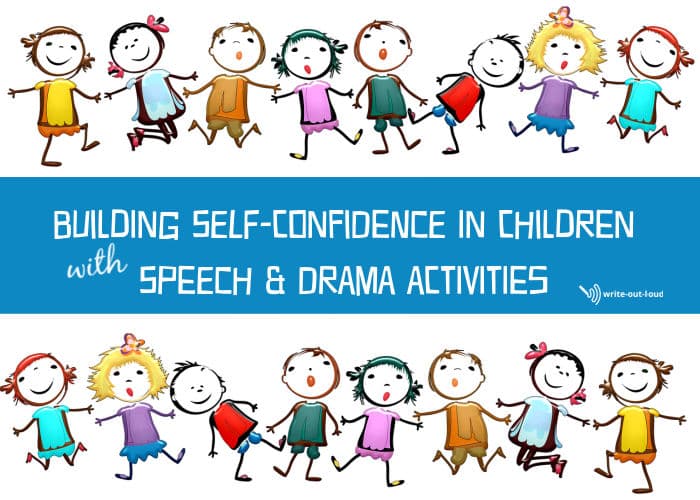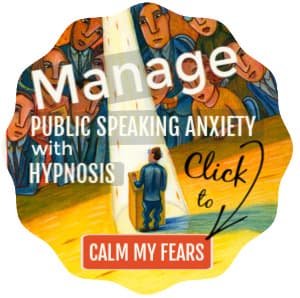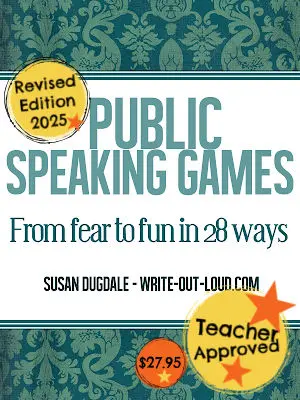- HOME ›
- Activities and games ›
- speech & drama exercises for young children
How to build self confidence in a child
Speech & drama activities for kids
By: Susan Dugdale | Last modified: 05-29-2021
Speech and drama activities are an ideal way to build self confidence in a child. If you have one who is anxious or afraid of speaking up in front of a class, adults, or perhaps even their peers, the suggestions and activities outlined below will help you, to help them.
They range from ideas suitable for little children just learning to string sentences together to ones for kids up to around middle school age.
You'll see, once you delve into them, they're really easy to set up, and many fall into the, "Of course. That's just commonsense!", category.
While it's an understandable response, many of us, myself included, don't naturally have this sort of commonsense! We don't automatically know the better ways to encourage a child to speak up. We have to learn them.
The positive benefits children receive from these activities will spill over into all areas of their lives. Effective communication skills, being able to speak up for themselves and to speak on behalf of others is empowering.
What's on this page
- notes to help you understand public speaking fear: the life cycle of public speaking fear, the real fear underlying it, the cost of allowing it to take hold & how to break the cycle
- about these activities: the difference between speech and drama

The life cycle of public speaking fear
Being afraid of public speaking is a fear acknowledged by many adults.
That children are afraid of it too, shouldn't really be a surprise. What I find more of one, is that their fear often goes unchallenged, all the way from childhood through to adulthood. These children become the grown-ups who frequently say they would rather "die" than make a speech.
The real fear underlying public speaking fear
The truth is not, that talking in public is a deadly disease. The real truth is many people, children included, fear being singled out in front of others.
Being publicly "looked at" and "listened to" is the problem. People fear being seen, for fear they are "not good enough" or that they will publicly humiliate themselves in some way. Being laughed at, making fools of themselves, or dismissed as stupid is the pain they're avoiding.
The simple remedy to side-step risking exposure many people, including children, adopt is to keep out of the public eye and their mouths shut. However that solution is a boomerang.
The cost of NOT speaking up
The child who is too frightened to talk up or feels so self-conscious they can't relax and join their peers in games loses out. They are often overlooked by their classmates and teachers in favor of bolder children.
The more a child is marginalized the harder it becomes to join a group or allow themselves to be seen. Then, when forced by circumstance, like having to give a formal speech in class, their discomfort and subsequent embarrassment or humiliation, is a self-fulfilling prophecy.
How to break the cycle of fear
The non-threatening drama and speech activities below will help break the cycle.
Before you rush to use any of them please make
sure you:
- Start slowly and simply. A nervous child is easily overwhelmed. Asking too much of them, too soon, will compound their problems. Choose your beginning point with care. Put yourself in the child's shoes and ask yourself, "Is this a little step or a giant stride?" Being "cruel to be kind" can backfire badly.
- Role model the behavior you want from the child. Show them it's OK and safe. Do the exercises with them. This has a wonderful double-whammy pay off. They feel valued because you gave them time and attention AND they are learning new skills.
About these speech and drama activities
The activities are separated into "speech" and "drama" because although inextricably linked, they are different.
What is speech?
Speech is one of our primary means of communicating with each another. It is the conduit for spoken self-expression. A combination of vocabulary, voice and experience gives each person their unique oral signature. This is who they are. It is an integral part of what carries their being, their presence into the world.
The speech activities focus on gaining and refining personal communication or presentation skills.
What is drama?
Drama extends speech. To dramatize is to enact.
Drama takes speech into the realm of the imagination and theater. Its activities focus on stepping into other worlds or experiences, i.e., acting.
It teaches empathy. Handled well, drama builds self confidence through providing opportunities for a child to experience the world from perspectives other than his own. In doing so, he does not become an egoistical show-off constantly needing applause, something many parents fear. Instead he becomes humane.
17 speech suggestions & activities to build self confidence in a young child
- Build self confidence by making unpressurized time to talk
with them.
Many of us talk to or talk at a child. We give instructions like "Clean your teeth!" or "Pick your toys up!". This type of communication is very different from talking with.
To talk with implies you are actively making room or time to listen to their side of the conversation.
- Another simple way to build self esteem is to ask open-ended questions. These require more of a response than a simple "yes" or "no". Try asking "why" or "how" to elicit extended answers.
- Get down to their level.
If they're sitting on the floor playing, get down with them. This reduces the gulf between big and powerful, small and insignificant. - Avoid doing the talking for a child.
Sometimes, as adults, it's easy to assume spokesperson status habitually. The child learns that you'll do all the talking for them and they don't have to try. They also learn you'll do it better than they can anyway. In doing the talking you rob them of practice time. Give it back to them. Even though you may have to wait for them to find the right words at times, know you're helping! - Avoid reinforcing baby language by repeating it frequently. This can be hard as sometimes a child's vocabulary mistakes are delightful and we don't want to let them go. But we must if we want them to grow. We can write down and cherish the errors but keeping them live for too long is unkind.
- Avoid teaching a baby language.
Why complicate learning to speak with giving a child a sub-language to learn which later must be un-learnt? Support their growth by teaching the right words from the start. By this I don't mean pedantically correct language but giving them a vocabulary appropriate for their age. - Build self confidence in a child through making a point of praising their speech
and correcting mispronounced words non-judgmentally.
"Good on you for trying xxx (said correctly) word. It can be tricky. Let's say it slowly together." - Play lots of language games.
These are great for car journeys.
Examples: Alphabet "I spy": I spy with my little eye something beginning with a, b, c, d etc., or rhyming word-chains: words starting with or ending in the same sounds. Example: cat, mat, fat, flat, sat... Or flat, floor, flood, flew, flop ... - Read stories aloud daily.
When they're very small start with stories built around repeating phrases and rhymes. If you read the same story frequently enough, your child will begin "reading" it along with you. Miss bits and they'll correct you. Talk with them as you go about the pictures. Get them to tell you about what's happening in them. - Singing songs.
Get your child singing along. If it's a favorite you can take alternate verses or take turns making up songs about whatever is going on around right now.Pick a well known tune and have fun. 'Old Macdonald Had a Farm' works well.
I remember our son enjoying variations like, 'Our Big Boy James is putting on his boots, e, i, e, i, o. He puts his right foot in and wriggles it around, e, i, e, i, o' ...etc.
- Read poetry aloud.
Children love the sounds of poetry and will readily imitate them. Try nonsense poems, fantastical poems, or ones with a strong beat full of words sounding their meaning.Here are 8 beloved classic children's poems to get you started. Click the link and you'll find activities, audio, as well as a printable of them all.
- Encourage "talking time" at the dinner table. Make sure each child has a turn, is listened to, and not interrupted. If need be put a time limit in place for the one who goes on and on! When they're finished, paraphrase what you heard and respond.
- If your child has difficulty speaking clearly and you're worried it could be a physical problem, get it assessed sooner rather than later. The problem may lie in their hearing or the formation of the physical organs and body parts needed for speech. Specialized therapists will do a superb job of advising the right way to address the matter. If you allow a speech fault to establish, they become harder to stop.
- Going to a local play-group or kindergarten will definitely help build self confidence. They'll learn in a protected safe environment to interact with people outside of their family circle.
- Take your child when you go visiting or shopping. It doesn't have to be all the time but enough for them to learn to feel comfortable in new situations with new people.
- Teach your child simple good manners and expect them to use them as a normal part of daily living. Making their own requests politely and thanking people for things or services received will build esteem and is a valuable first step toward solo public speaking.
- Model good listening and speech.
A child learns from those closest to them. If you don't listen or speak well, it becomes more difficult for the child to develop the confidence to do so.
19 drama suggestions & activities to build self esteem in a child
- Actively encourage their imagination and
allowing them to experiment and play with dress-ups.
We had a large wicker basket of old clothes. There was a cloak, coats, some hats, lots of scarves, shoes, bags etc, etc.I found the more definite the costume, the less it appealed. The more flexible the items were, the more readily they were put on. The cloak was magical one day because it made the wearer invisible and the next it became a glamor item for going to the ball.
Also favored were discarded 'father' or 'mother' clothes. These allowed children to experiment with being adult.
- Encourage the retelling of stories in
their own words.
Choose either true family events or a familiar tale that's been read and read as a bedtime story. Within these, encourage taking on the voices of the characters. How did the wolf talk? What did the Grandmother say? How did her voice sound? Can you make that voice? - Take your children to listen to story-tellers or children's theater productions
- Listen to stories read by trained actors.
- Limit the amount of screen time a child has and monitor what they
see.
A lot of screen time has been shown to have a significant impact on the development of a child's brain*. A child watching is not actively working. They're passive. In comparison, making your own play is hard work physically and mentally. Turning off the screen will really help build skills and positive self-esteem! - Allow 'truth' or 'reality' to be suspended
providing the play is safe.
Jumping off the garage roof with an umbrella for wings is going to hurt but having an invisible friend or changing your name for awhile is relatively harmless. Provided it's accommodated without undue fuss (either negative or positive), your child will let it go when they're finished with it. We had "Pascal" living with us for a while. - Allow for 'mess' to happen. The easiest way is to say where and when the play can occur without inconveniencing everybody.
- Play yourself.
Get involved without taking over the direction of a story or piece of play acting. This way you're showing it's OK to 'pretend' and leaving the authority with the child.We've eaten dinner with spare chairs and places set for invisible guests who asked for special foods. I remember a toy train that talked, a teddy bear who threw temper tantrums...
- If the child volunteers to make a play, tell a story, sing a song for the family to watch, help them to do it without taking over. Ensure any comment or feedback is constructively positive and appropriate.
- Do discuss the plays or fantasies your child creates with other adults in their
presence but avoid ridicule or mockery.
Be careful too, about setting them up as entertainment outside the family particularly if they are under eight. Too much attention and praise for being clever, amusing, a real clown or for copying an adult performer can be counter productive. There is a fine line between learning about being another and learning to be one's self. You don't want a child whose sense of well being is largely derived from being the center of attention and someone else! - If you decide to take your child to drama lessons or a group, check the agenda
before enrolling.
Some groups offer wonderful programs designed to enrich and extend appropriately. Others are not so scrupulous. A child is a child. They should be allowed and encouraged to be one. Ask to see a curriculum and talk over teaching styles.
A very shy child can be encouraged to participate gradually through taking part in group or chorus work before taking on solo parts. Instant solo focus or an insensitive comparison with a more outgoing child will shut a tender one down quickly. - If you do offer criticism because you were asked,
make sure it follows a commend-recommend-commend model.
Do not compare one child with another. If you must compare, do so with what that particular child did yesterday and what they did today, or in this part of the play and that part of the play.
Be specific rather than global in your comments. Telling a child he did a great job or that it was awful doesn't communicate anything useful. The first gives him nothing to improve or build on. (It's all good, so why bother?) The second denies anything of value happened. (Again, why bother?)
Also practice asking them for their critique. They will know what happened. Help them to learn to trust and refine their own judgement.
For more see "What Does Too Much Screen Time Do to Children’s Brains?" by Jennifer F. Cross, M.D., Pediatric Behavior & Development
As a child gets older drama can become more structured or formalized
In a classroom setting this can take place as a natural extension of a lesson or as a lesson in itself.
If you're a parent at home looking for simple drama exercises to help build confidence try these:
- Re-telling well known stories in which the child takes on the voices and
actions of all the characters. Examples: Little Red-Riding Hood, Goldilocks and The Three
Bears, or some of the wonderful Dr.Seuss stories.
(Don't get carried away with costume and make-up. The less, the better. The key is not the trappings but the drama itself and acting it out as vividly as possible.) - Take a theme from a current lesson to
turn into a mini-drama. This could focus on the people involved or the things. The cycle
of the seasons for instance adapts well. It could be taken from Winter's point of view, then
Spring's etc., etc.
With imagination any lesson has dramatic potential. The idea is to keep it simple. Once they get too complicated they can spiral out of control and become overwhelming. The length should be about 3 minutes maximum to start with.
Encourage structure: Introduction, Middle or Development and Conclusion. - Talk as if...you're a showman at a fair, you're a Queen, you're a radio
announcer, you're a rock star, you're an elderly person, you're very brave...
Ring in the changes promptly allowing about one minute between each. Do it with your child. Once they get confident swap suggestions back and forth.
If you get met with refusal to play, don't buy into the argument or, go into long explanations about how it is good for them.
Instead, step back and realize they are probably feeling afraid of getting it wrong! Show them by doing it yourself that you don't have to be perfect. - Walk as if...you're a cat, you're very tall, you've got wobbly legs, you've got
one foot always wanting to go its own way, you're important, you're very shy, you're the
President, you're walking on ice...
Again the key is rapid changes of body language. This is a fun game to play in the park or while going for a walk. Watch though that you don't expose the child to ridicule either through your own antics or theirs. Choose your moments! - Swap a hat...
Have a collection of hats. Each denotes a different character. When you're wearing this one, you talk and move like this. When you're wearing another, you behave differently. The more radically different the hats the better.
You can source these very cheaply from your local thrift shop. - Swap a face...
Make a face and have your child copy it as exactly as they can. Hold it and speak as you think the face demands.
Now it's you child's turn to give a face to you. Keep going. Making faces is fun and can be played anywhere! - Make a small speech (story) about xxxx (What I want for Christmas, My
little brother,...) as if you were the King of the world, the man from the corner shop,
Grandma...(Pick subjects and people or models the child knows so they don't to work too
hard to imagine them.)
A very freeing benefit of this activity is the discovery that when they are playing at being someone other than themselves, they do not feel the same vulnerability as they would if they were simply themselves.
AND my last tip...
Please do not ask a child to do things you are unwilling to do yourself. If you are nervous about speaking up in public and show it through criticism or throw-away comments, you feed and normalize the fear a child feels. They'll pick up your anxieties very quickly.
If this is you and you want to help build esteem in the children close to you, be prepared to overcome, or at least own, your own doubts and insecurities.
An absolutely safe and supportive way for you to do this is to join a local Toastmaster's Group. This is an international not-for-profit organization dedicated to helping people become confident public speakers. You'll find them fun, interesting and challenging as well.
You'll learn new skills, meet new people and soon be doing all sorts of public speaking you never thought possible. Look on the website. You're bound to find one near you. Ring and join them.
AND, yes, there is one more PS :
If you're a teacher reading this and you have a fear-filled child plus a curriculum demanding that they give solo speeches, take the time to make it easier for them by:
- Giving lots of lead in time so it doesn't spring up on them.
- Ensuring there is topic selection help available.
- Providing models (especially older children who have been there, done that, and survived) to share their experiences and wisdom.
- If the class dynamic supports it, using a buddy-system for planning, writing, and rehearsal. Team up people so as the doubtful are placed with those who can support with care. Provide clear guide-lines for good support practices.
- Organize rehearsal times in which you will be present to give suggestions. This gives a scared child experience of the space and speaking ahead of the real thing.
- If circumstances permit, be flexible enough to allow speeches to be given to a chosen few
- Be sure to praise any move however small toward conquering fear.
Do you need help with speech topics suitable for children?
There are dozens of speech topics for kids here, ready for you to take as is or adapt for your own needs.
Or check here for more public speaking games. You'll find activities to adapt as well as ongoing links to more.
Breaking the cycle of fear in adults
Maxwell Maltz (1889-1975), author of "Psycho-Cybernetics" said, "Low self-esteem is like driving through life with your hand-brake on."
If you've got the hand-brake on and want simple effective strategies to remove it and boost your self-esteem read this article from the Cornerstone Edu blog: Life Long Learning Matters.
- Top of 'build self confidence in a child' page
- Return to write-out-loud.com home page




